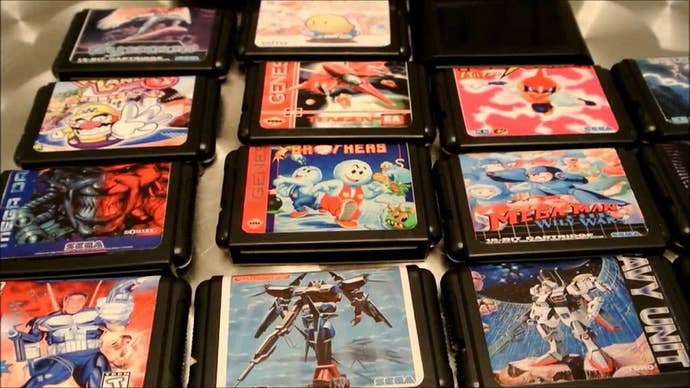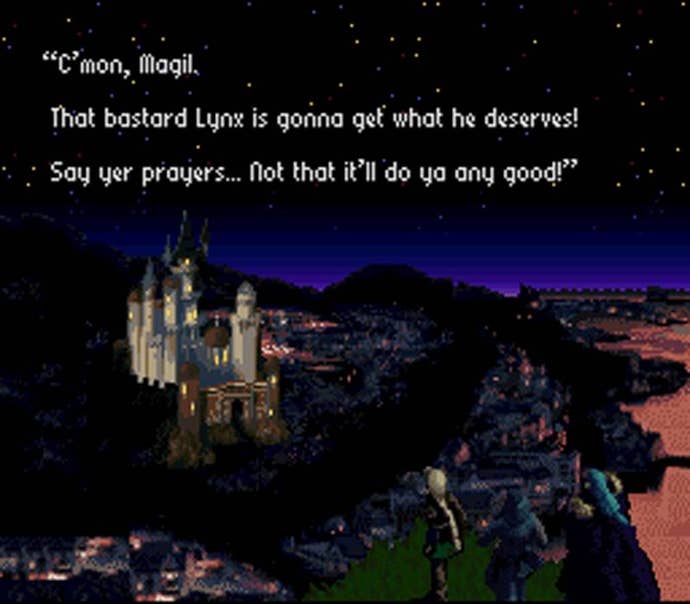Reproduction Cartridges and Elegant Piracy
How a byproduct of emulation became gaming’s Cuban Cigar.
This article first appeared on USgamer, a partner publication of VG247. Some content, such as this article, has been migrated to VG247 for posterity after USgamer's closure - but it has not been edited or further vetted by the VG247 team.
Walk around the average video game conference or gaming expo and chances are pretty good that you’re going to see some rare stock. From a complete package of Snatcher on Sega CD to the only copy of Spider-Man: Web of Fire that you’re likely to ever see in person, some of the best reasons to see vendor tables is to dig through the rare and beautiful diamonds out in the wild. Without question, there are games out there that are perpetually hard to find, and more get rare year after year.
But these conferences, expos, and swap meets are changing. While the average passerby can find tables littered with NES, Master System, and PlayStation software, increasingly, there are tables of other, similar goods priced just a little higher and kept in much better condition than half of what you just rummaged through at that last guy’s table of Famicom stuff. To the untrained eye, these are finds indeed, having unfamiliar titles like Earthbound Zero and Castlevania: Blood Moon. Then your nerd synapse snaps back into place and you remember how many NES Castlevanias actually exist and it hits you: This table is selling unlicensed games. So is that table over there. And that one. And half of this whole place. In some expos, vendors with a stock of official releases might be turning into the rarest find of them all.
Unlicensed reproduction cartridges are becoming more common to the collector space by the day. As they become more pervasive, the unwitting game enthusiast needs to know what they are, their actual collectability, and the cottage industry’s questionable legality.

These unlicensed games are known by many names; "rom-hacks" and "fan translations" being common, but none so much as the "reproduction cartridge" (or simply "repro"), a term that tidies up what these games actually are. Essentially a byproduct of software emulation, repro cartridges can be just as many types of games as there are names to call them. All of them are, basically, games that you know and love altered to one extent or another, and flashed onto an existing cartridge that will work in your Atari, NES, SNES, Genesis, or any other cartridge-based system. Ultimately harmless to own and maybe even a nice curio to round out a collection, the questionable legality of selling them has turned them into something of a Cuban cigar for retro game collecting, though, perhaps without the cultural cachet.
In laymen’s terms, it works like this: several years ago, talented programmers concocted emulators, which essentially found a way to trick a computer, phone, or other device into thinking it was an NES, Genesis, or even an Apple IIe computer. Actual software that runs on these emulators are roms, which are the image of a game or other computer program run through the emulator to work. By themselves, they’re a wonder of computer engineering in that they can help preserve the winding (and largely unkempt) history of the video game medium. Repro cartridges basically reverse engineer what was already reverse engineered so these altered roms can play on an original piece of hardware. I asked one repro seller that chose not to be named for this article how this works, and it was explained clearly:
"[You] burn the rom image onto a chip the same size as the rom. This chip is then put onto an adapter that mimics the pinout of an original SNES chip. Once this is done, I need to apply that to a suitable NTSC donor. Many times this is a game like Madden."
In this example, Madden cartridges for older consoles being common as dirt, buying a stack of them at a store that still trades in old cartridges will probably only set you back a buck or two apiece. Factor in the cost of the chips, the time it takes to flash it onto a rom onto it, and then whatever you pay to print your own labels, and most sellers turn right back around and sell them for $45-$65 a pop making a nice little profit for an afternoon’s work. Want to preserve those copies of old football games, though? "There are companies making new boards for this," the anonymous seller told me, "so originals don’t need to be sacrificed."

Generally, repro carts fall into three categories: the first, and perhaps least common, is a broad umbrella of prototypes or games that never made it to official home release at all. There are many, many video game roms floating around the internet that were never finished by a developer, and usually for good reason like the Genesis/ MegaDrive version of Ninja Gaiden or, perhaps more famously, the unreleased GBA Resident Evil that hit the internet a few years ago. The other side to this is are games from the proto-download era that were only playable via Nintendo’s Japanese satellite network Satellaview or the Sega Channel such as the Chrono Trigger sequel Radical Dreamers, Mega Man: The Wily Wars, or Golden Axe III. Having only lived a brief life on ephemeral services that never intended to package games and sell them to retail, a large set of franchise fans can play games that were once officially-released games now lost in ether.
Fan Translations are the second most common. These are games never localized for the western market with English translations applied to the rom before being flashed onto a cartridge to replace their original text. While there has always been a rabid import scene for game collectors, text-heavy games of the 8- and 16-bit era (like RPGs) were almost unplayable without a passing knowledge of Japanese. Over the years, heroic fans of these games painstakingly recode them to translate and place in English text for the enjoyment of the curious and the hardcore alike. The most famous tend to be from famed franchises and developers that never released their entire catalog in the West like Squaresoft’s action/ RPG Seiken Densetsu 3 ("Secret of Mana 2") or strategy RPG Bahamut Lagoon. "I think fan translations are the highest sellers that I’ve noticed," says the repro seller. "I think the reason they sell the best is because of the quality. It’s ha
rd for a single person hacker to achieve the quality as the original games."Some come close, though, he said, and here we find the most pervasive repro cartridges on the market: rom-hacks. These are games either slightly changed (like adding Shadow the Hedgehog into the first Sonic game), or are a total rebuild from the ground up using the assets found in the original rom, thereby making unofficial "sequels" to beloved franchises. Gaming’s most famous characters are the ones most commonly found to have rom-hacks, the vast majority of which are from Nintendo’s stable of characters.
Repro cartridge dealers are rarely programmers themselves. Since all of these are games ripped from files found on the internet, the differences from seller to seller are largely cosmetic to the cartridge. Some more artistic or enterprising sales teams will go so far as to recreate packaging approximate to an original SNES or Genesis release, complete with printed instruction manual and cardboard inserts. This ratchets up the price for each game, given the cost of printing and manufacturing (and coming up with the clamshells for Genesis cartridges). Taking all of this together, you’d be right in inferring that there’s no real collectability to these whatsoever past sentimental value and how you like one seller’s label printing over the next. A quick search on eBay for these kinds of games usually shows off the best repros, at least in terms of quality of packaging.
But this same search will also reveal darker side of the repro market: full on game counterfeits. As the process to produce a cartridge and print custom labels and boxes have gotten easier and easier over time, the more dubious dealers in the repro scene will make complete new packages for games like the infamous Nintendo World Championship cartridge. The uninitiated may not know that there are only a handful of legitimate World Champion carts floating around, so the $100 you might pay from an unscrupulous dealer seems like a steal. Like many checklists of things to watch out for on the internet will tell you; buyer beware.
All of this, of course, is less than perfectly legal, much like the software emulation scene that birthed the repro cartridge market. While owning a cartridge by itself isn’t a crime, exchanging money for one is where things get dicey. The dealer is generally the one at fault as they are selling pirated software. Curiously, this doesn’t stop many, many dealers from openly selling games on the internet on their own sites and, again, places like eBay. "I personally have never been served with any cease and desist letters or emails," said my unnamed sales person. A note on that, this seller has been in the repro games market since 2012, and one can assume that others have been doing it at least as long, if not much longer.
So, really, where is Nintendo in all of this? They certainly have the wherewithal to make an example out of a smalltime dealer. Why aren’t Capcom and Konami’s lawyers making phone calls? As recently history has shown us, they definitely could use the cash. How isn’t Disney cracking down on some of these guys for selling games with their IP? They are absolutely not an enemy you would want. "[I think] reproductions are rampant enough that Nintendo has most likely noticed," I’m told. So, what’s the deal?
The logical conclusion is that it might just be too big to combat at this point. Much like emulated games found easily with an internet search, a seller can quickly and cheaply gather the materials to make repro games and throw them on the web. If they get caught or slapped with a cease and desist letter, they still have trade shows to sell games at, which do not regulate what can and cannot be sold. Any brick and mortar retailer that keeps tabs on their inventory and sales cannot openly sell them, either, as it would be no different than pirated DVDs bought by a sidewalk vendor, but less scrupulous dealers trade in a small stash of them, as long as you’re willing to pay cash. Some retailers do take a more honest stance, though. The picture of the Super Famicom cartridge of FEDA attached to this story was purchased from a different vendor that only sold repros along with original cartridges which are still cheap enough to obtain. He wasn’t entirely sure if that made everything above board.
But it might still help his conscience.
